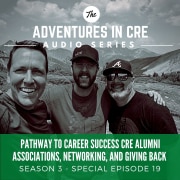AIs Impact on People | S5E8
In this episode of the Adventures in CRE Audio Series, Spencer Burton and Michael Belasco take on a critical topic: the ethical and practical implications of AI’s impact on people within the commercial real estate (CRE) industry. As automation and AI agents become increasingly prevalent, the conversation explores both the opportunities and the challenges these technologies bring.
Spencer and Michael discuss the concept of “creative destruction,” the disruption AI introduces to traditional job roles, and the importance of adaptability in a rapidly changing industry. They also emphasize the need for professionals to develop key skills like relationship management, strategic thinking, and mastery of AI tools to thrive in this new era.
This episode offers valuable insights into the future of work in CRE and how to stay ahead in a tech-driven world. Don’t miss it!
AIs Impact on People
Or Listen to this Episode
Resources from this Episode
Episode Transcript
Michael Belasco (00:08):
All right, for this episode of the ACRE Audio Series, season five, we are… Well, first we’re on the theme of AI and its impacts on commercial real estate. This is in tandem with the launch of Spencer’s new company, CRE Agents. And we wanted to get into something that we both think is really important, which is the ethics and potential risks of introducing AI. Not to the world, but particularly to commercial real estate. And we’re not going to pretend that there aren’t any, and that it’s not a risk to… It’s basically taking functions away, jobs, job functions from people. And so it’s something to talk about. It’s something that I know Spencer thinks deeply about and thinks a lot about it. We’ve had many conversations, so we couldn’t let this series go without diving into this topic. So I’m not exactly sure where to start. Maybe we just get into it and we… Yeah-
Spencer Burton (01:15):
There’s a lot of places we can go with this. I’ve thought about this a lot. I am not the only one who’s thought about this a lot, and my ideas aren’t necessarily unique, but let’s just talk through how we think about it, how I think about it, how you think about it. I think we are largely on the same page-
Michael Belasco (01:36):
We are. Oh, if you don’t mind, go ahead.
Spencer Burton (01:38):
Yeah. So I guess where I was going though is this is inevitable. This is creative destruction, the concept of old technology replaced with new technology. As you have these transitions, there is disruption. Disruption is a nice way of saying what people do changes, and some people are unnecessary and some technologies are unnecessary. Companies will go out of business because of this. People will lose their jobs because of this. And I say this, I’m really talking AI agents, but AI is a broader application. We talked about physical AI in another episode, what people do changes and when that happens, you have job disruption, you have business disruption, and there’s real pain in that. We saw recently the dock workers strike last year.
Michael Belasco (02:37):
Yeah, I remember. Yeah.
Spencer Burton (02:39):
Prior to that, we saw the Writers Guild strike. And a lot of those are driven by what is coming and the unions working to protect their people from job loss. Nevertheless, this technology, as with all technology, it’s inevitable and it brings disruption with that. Anyway, that’s the intro from my standpoint. How do you intro this?
Michael Belasco (03:02):
Yeah, no, I think that, A, that’s a great intro. B, I think there’s a human emotional reaction. It’s anxiety. It brings anxiety quite honestly. We are on the precipice of something very big and you see it in every day. You had two good examples. I remember before we got together for our annual meeting, and you had seen it too because I was on Reddit perusing and happened to see this post where I think it was the newsrooms of every local news station that had TV shows basically saying, we’re all out of work, we’re out, and AI’s come and take our job. It’s like, oh wow. And that was a big theme. It’s a heavy conversation. And so again, to your point that it is happening, it is coming, it is happening. So yes, accept it. How do we then transition, because there’s tons of opportunity that gets created out of this, and that’s how I look at it.
(04:05):
People don’t want to change. And a lot of people who are… You push against it and you’re like, now I got to learn something new. A, I got to learn something new. B, what is it? What do I have to learn? What do I have to clamor to know? And I don’t know. So this wave comes and nobody’s totally prepared because nobody knows. We just know that this is coming. So what is it? What is the new paradigm? And let’s just stick to commercial real estate. What is the new paradigm of the commercial real estate workforce? And I think I certainly spend time thinking about that now, I have a clearer vision and I think I don’t have any clear solutions, but that’s an issue that everyone should be focusing on because it is going to transition.
Spencer Burton (04:47):
So I had this interesting discussion. I hope it’s okay to share this, with the general counsel at Stablewood who he’s been in the workforce 35 years, probably, maybe longer. We’re talking about this very thing. And he’s so cool because he right now is building his own custom GPTs for, call them paralegals to understand the JVA, the joint venture agreements that Stablewood has, so that anytime he has a question, he can query it. And so here you’ve got this individual who is nearing the end of his career. And in a stereotypical way, in a stereotype, would not be adopting this technology. And here he is building his own custom GPT.
Michael Belasco (05:35):
Yeah. Yeah.
Spencer Burton (05:36):
And so I asked him about, it is inspiring to me, and he’s like, Spencer, when I started my career, I started at a shop. I was an associate, and what I did was I read briefs and I wrote, and now I’m out over my skis because we’re talking about what young attorneys do, but in essence, all this manual work that got replaced by technology in the early days, oh, there were typewriters. So that’s what he was describing. There were these typewriters. And so he would read a brief and then he would work with the typewriter and that typewriter would write out whatever, and then word processors hit the scene and he got a word processor and he started doing the writing rather than having to give it to this typewriter.
(06:22):
And in the coming years, typewriters that is no longer a profession. And he’s like, I have seen that my career, us go from that to word processor to more powerful PCs to all the way to today where he’s building custom GPTs to help him strategically think about documents. And that is a mindset that is inspiring to me because the opposite mindset is how dare you take away the typewriter?
Michael Belasco (06:52):
Yeah. And I’m going to add to that because you said paralegal, and you had mentioned we talk about this, you’re taking away the repetitive tasks so people can realize a higher potential for themselves or go out and do work that’s, A, more meaningful. My brother, went to a good school, had a degree that was totally unrelated, but became a paralegal for a time being. And the money was great, and he’s like, I don’t even… I’m doing this thing. And it was fine. For some people you could have just sat there and done it forever. He’s not that kind of guy. He has his own company, launched it, College Transitions. I’m going to plug it by the way, in case anybody’s looking to get their kids into school. But he couldn’t sit there forever and do that. He wasn’t going to, he voluntarily left. But the point is he could have sat there forever and made a good living, but instead went on to pursue something that he was passionate about.
(07:50):
So that’s a good… You take a repetitive… Not that paralegal jobs are repetitive, but you take a test like that could potentially be automated and you take that person out of the equation and then they have to find and evolve into something that becomes more, maybe more meaningful, maybe. I don’t know where this goes ultimately, but if you are forced out of your comfort zone, like you forced yourself. Some people get a nudge and a lot of good things potentially happen. So I’m not saying that’s where it’s going to go. I’m not like the eternal opti… Is all going to work. Don’t worry. It’s all going to work out. We don’t know. We don’t know.
Spencer Burton (08:24):
Yeah. When you take this to its end in your mind, you get to some scary places, you also get to some very positive places. It really depends on if you’re an eternal optimist or an eternal pessimist or something in between. I think though, for those of us who are in this conversation right now, it’s not particularly productive to think about a world in which AI agents do everything or physical AI robotics do everything because there’s all sorts of blockers to that day. We talk about the airplane. So anytime you have a high impact decision, we as humans expect to have a human make that decision.
(09:06):
And we talk about airplanes because the high impact decision is if it goes wrong, if the decision’s… Then you’re talking about loss of life. And in real estate, high impact decision means loss of real money. And at least right now, we’re not willing to give up those decisions to AI and for the foreseeable future. And that’s just one example of many blockers. But what we can control or what we can forecast is call it through the balance of our life. And it’s like I look at that and I say, okay, what’s the impact on people? The impact is people are going to do different things.
Michael Belasco (09:48):
Yeah. And maybe there’s something we can [inaudible 00:09:52], and you and I can have a brainstorming session live here because AI, we know based on your model, is there are the repetitive tasks in life that can be duplicable, is something that is likely going to be handled or could potentially be handled by AI. There are things out there, and if you’re thinking just in the world of commercial real estate, well, maybe it’s not today, but at some point that’s going to go away. And so where can we shift right now so that we’re prepared for that shift? And I think this is something that we at ACA are going to start to think through and maybe even produce content on. But maybe you and I literally right now have a brainstorming session. What are the key skills and stuff that cannot be duplicated-
Spencer Burton (10:38):
Or cannot be performed by AI. Yes.
Michael Belasco (10:40):
What can you prepare for? I don’t have any ideas.
Spencer Burton (10:42):
Okay, so this is my view. This is just Spencer’s opinion. I could be wrong. I probably am, I often am. But my view is that, and I’ve said this on other episodes, but I’ll repeat it. Relationship management, I have this framework that I teach when I go to schools, which is your value in real estate really is a function of two things, your relationships and your deal seasoning. I don’t think that changes. Your network is a function of your ability to manage relationships. The bigger and the deeper and wider and more credible your network, the more valuable you are. That will not be outsourced to AI agents. And so we, as people, in fact, as these things do more repetitive tasks, that frees us up for more time to manage relationships.
(11:34):
In some cases, it necessitates more relationships. I have this example at Stablewood where when you underwrite 50,000 deals without this technology, we probably in that same time, maybe would’ve underwritten 5,000. When you underwrite 50,000 versus 5,000, that’s 10 times the number of broker conversations, or at least 10 times the number of broker interactions. Maybe it’s 30 times. And the reason I say 30 times is because you’re probably three interactions with the broker for every single deal, two interactions. But the point is you greatly increase the number of broker interactions you have. And many of those interactions you want a person to do, you greatly increase the number of strategic decisions that are made.
(12:22):
And those, to me, that is not something you outsource to AI agents. You greatly increase the amount of strategic thinking that’s done. And so I think the point is, if you know where the puck is going, you can skate to it, or put another way if you know how, and if I’m right, and that’s a big if, you can personally prepare for that such that you have the skills to be able to perform the tasks that are going to be key to real estate. That’s my view on it. How do you think.
Michael Belasco (12:54):
Yeah, no, I think that’s great input. I would add that even you would say there’s these skills that you need to cultivate. There’s also these technical skills that are changing. And I would think of it as people who have their entry-level jobs in commercial real estate might not be doing, and they’re always going to need to be there. They’re not going to be doing some of the mundane tasks and how the AI agents are, but what they will be doing is starting at a more senior level. For example, you will have agents or an analyst was doing this tedious test. Now an analyst may be learning how to orchestrate the agents because the agents are still needing direction. You still need to be able to utilize that. So utilizing the agents in and of themselves becomes a skill set that needs to be learned. You’ll have tremendous power at your fingertips and the person that could utilize that best. We were talking strategic thinking. You have all the answers to things. Maybe there’s data, maybe there’s ways you can synthesize. You almost become more of a conductor of the orchestra of agents, rather than–
Spencer Burton (14:04):
Well, I this is a really important point.
Michael Belasco (14:08):
… a player of an instrument.
Spencer Burton (14:09):
Yeah. Though this is a really important point. So I think what you’re saying is you hear this and you go, well, I don’t need real estate financial modeling anymore.
Michael Belasco (14:20):
Yes.
Spencer Burton (14:21):
Or I don’t need to understand a lease anymore because someone else is going to abstract a lease for me. That is so wrong.
Michael Belasco (14:27):
Yes. Yes. Yes.
Spencer Burton (14:28):
What it means though is how you interact with that thing whether it’s… And I use real estate financial modeling because that’s something that we spend a lot of time at ACRE, but it really relates to every functional area of real estate. You need to understand it as well or better. I’ll give two examples of why. The first is math. When you took your math classes and you would learn how to do a certain thing, I remember as a kid going, well, there’s a calculator that can do this for me. Why do I have to do this? Well, if you don’t understand what the calculator’s doing, you don’t really understand that thing, and therefore you can’t work in an environment where you’re doing that thing without understanding the underlying component of it.
(15:13):
A real world example for me is I developed residential housing in Panama. I think everyone’s aware of that. And one task that’s performed on a residential construction site is the curb, gutter and sidewalk. And in a place like Panama, curb, gutter and sidewalk is a manual task. Forms are laid by people. So all the measuring, the laying of the forms, very back-breaking work to the point where shovels to dig out and then hands to create and lay the forms out. And then the pouring, the truck would come in, they pour, and then the people would form… Curb gutter and sidewalk took days and days and days. In our country, in the United States, and I think in a lot of places in the world, there are curbing machines. And how a curbing machine works is it is a rudimentary robot that does most of that work. And so what would take 20 hours takes two, but the two hours that the person does is highly technical.
(16:37):
It’s understanding the work that the curbing machine performs and ensures that the curbing machine is appropriately set up. And by the way, this is like a high-risk task because if the curbing machine does it wrong, you lose thousands of dollars worth of material and you have to start all over. You got to tear that out. And so the importance of the person, if anything, is greater because they have to ensure that that curbing machine is set up properly and performs its work in such a way that the curb is right, but the person is elevated. They’re no longer breaking their back, but they’re thinking about what is happening and they spend two hours to perform the same work that in a very manual task is 20. But that doesn’t mean they don’t have to know how to form and put a curb, gutter and sidewalk. And they absolutely do, but they’re not breaking their back doing it. They’re thinking strategically about it.
Michael Belasco (17:36):
Exactly. The skills that you need, the knowledge that you need doesn’t change.
Spencer Burton (17:42):
No.
Michael Belasco (17:43):
In fact, it’s even more critical because I remember being an analyst and I’d put a model and I’d walk into my senior managing director’s office. I’d put the model in front, I’d be all nervous, and he’d look at it back in the day before you really were able to analyze. He’d look at a couple metrics and say, I think something’s off here, and here’s why. That skillset becomes more paramount. And the people that can do that, and again, we’re talking financial modeling here in that example, but the other side, I don’t want to say the other side of the coin. It’s not exactly the other side of the coin. It creates opportunity for macro growth. If that same guy’s not spending 20 hours on the same-
Spencer Burton (18:24):
Form.
Michael Belasco (18:24):
… The same task can be performed in two hours, in 20 hours, it frees up growth and opportunity. And whether that’s good or bad, again, I don’t know. Are we going to grow too fast because of that? I don’t think we can possibly fathom all the ideations that come out. One of the things they talked about when… There was another video you shared with me, and they were talking about how when SaaS came out, there were three categories. You probably know what I’m talking about. One was where people could dominate. The first one was trying to get Microsoft Office into a web app, which is actually, it was one of the… I forget this video you sent me.
(19:04):
And no entrepreneur, no startups touched that space. It was all the-
Spencer Burton (19:12):
As it should have been. Yeah.
Michael Belasco (19:13):
And then the next one was the things that came out of left field with SaaS. They were talking about Uber. I forget what the… We should-
Spencer Burton (19:21):
Airbnb. Yeah.
Michael Belasco (19:22):
Airbnb, all these things that came out and that was dominated by people that the juggernaut industry couldn’t get their hands on. And then there was the last one, which was the B2B, which was like, we’re all the companies, there was thousands, I think they said thousands of just massively successful companies and-
Spencer Burton (19:38):
Who understood the distinct problems that most people don’t.
Michael Belasco (19:42):
And so I think it creates an opportunity where somebody might look at it as a downside. It’s like, well, if this downside was never presented to you, then whatever upside that you may fall into would’ve never happened. There’s one story I used to tell all the time, and in fact, my kids watch Bluey all the time, and they did it in Bluey and they did it differently, but it’s the story of who knows what is good or bad. Do you know this story?
Spencer Burton (20:05):
No, I don’t.
Michael Belasco (20:06):
It’s basically, Bluey has it too. So if you find the Bluey episode, they tell it better than I do, which is so funny. I used to say this story all the time. I think it was Rumi. It was like, I forget where it came from. That’s where I was told it came from. But basically, it’s like a farmer in a village and his son, and he’s out in the field with his horse and his horse breaks through the fence and runs off. The horse does all the work. So all the people came up and they’re like, oh my God, your horse. How are you going to make a living? And he’s like, who knows what is good or bad? Next day, horse comes back, brings all of these wild horses with him. And all the villagers come and they’re like, oh my God, this is amazing. Now you can do blah, blah, blah. And the guy’s just tranquilo for all the… He’s just, who knows what is good or bad.
(21:04):
His son goes out, who’s like the guy who’s really doing all the work. He goes to train the horses. He’s training the horse, gets in some scuffle, not a scuffle with the horse, but something happens. The guy breaks his leg and everybody comes up, oh my God, this is horrible. What are you going to do? Who knows what is good or bad? The next day, the army comes and there’s a big war, and they’re coming to take away all the men from the village, and the son just can’t go. He’s laid up and his leg’s broke. And then basically the culmination is like, who knows what is good or bad?
(21:37):
So opportunities come from uncertainty and just unknowing. And sometimes there’s things that happen that may feel like, and I’m speaking to the people who have a pessimistic view on this, but that you just never know. There could be tremendous opportunities like people who got into the SaaS space, for example. Not that everyone needs to get into the AI space. It’s not what I’m advocating for, but just that the world is going to change and there’s going to be potentially, I’m optimistic, there’s going to be a lot of opportunity, a lot of creative and new things for people to be doing.
Spencer Burton (22:17):
Well, Sam Altman was on a, I think it was a CNBC interview the other day. He does a kajillion interviews, so who knows which one it was. And they were talking about this thing. Well, they were talking about AI agents, and the question came up around job loss, and he acknowledged that everyone does. This creates disruption. Disruption means jobs are lost and jobs are gained, and how that shakes out TBD. But he said, I am confident that this will make the world a better place. And people can disagree with him, and that’s again, that’s that long view that I can’t even forecast out. In real estate forecasting, the longer out in the future we get, the less confidence we have on the output.
Michael Belasco (23:00):
Spencer Burton (23:01):
Yeah. It’s like, I don’t know what my reversion value is going to be a 100 years from now, but I can certainly think about it a few years. But his point was, yeah, this is going to make the world a better place. And then he used the example, which I thought was interesting. First off, he was saying, the world’s a better place. It’s going to make our lives better. It’s going to elevate people such that we’re doing things that are more interesting, more rewarding for us. And you could argue that there are still plenty of jobs that are less rewarding. But then he used the example, he said, imagine several thousand years ago you were to talk to a subsistence farmer, or that subsistence farmer could see what we do today. And he says, he would look at what you and I, and he pointed to the interviewer and he said, he’d look at what you and I do and go, you guys aren’t working. You’re just having fun while you’re doing it.
(23:57):
But the point was, it elevates people. Technology’s like this. And what I am confident about, at least as it relates to the phase that I can forecast, is that this technology on whole net will make lives better for people in commercial real estate. Not without paying, not without disruption. When I weigh it, there will be more opportunities and there will be the opposite. And those who are prepared, there’s a saying early on in this where it’s like AI’s not going to take your job. It’s the person that knows AI that’s going to take your job. And that’s really describing this world where there’s going to be opportunity. And if you are prepared for that opportunity, this is going to be a pretty good thing for you.
Michael Belasco (24:44):
Yeah. And I would hope that our website will be a resource that will help you guys prepare. And like I said, Spencer has been leading the charge in here, but I’m really just passionate about making sure that we, as our core has been to like hell, and we fell into it, but it became like a, I’m proud of all the people we’ve helped, and that’s something we want to continue to do. So again, we’re going into this maybe with a little more visibility than others, but not much just because of how rapidly it’s changing. But we hope we can be a resource for the changing industry. And again, all of that will be-
Spencer Burton (25:24):
That is absolutely ACRE’s mission. And one of the reasons why it became our fourth pillar AI, because we knew it was going to be disruptive. We knew that there was opportunity. We knew also that ACRE readers needed support as these changes happen in the coming years and decades. And so that will continue to be our mission. And to the extent that you all have ideas for how we can help, please let us know. Is that how we wrap up this episode?
Michael Belasco (25:58):
Yeah. And I would say anybody that’s in our community that has ideas how to help too. We are always expanding and love to have people that have the same mindset as us. But yeah, I think that that wraps it up. We’re in exciting times and it’s been, I guess we are ending, this is the last episode, so I guess this will be the last one in the queue. Yeah. But I’ll wrap up and say thank you everyone for sticking with us through the series. I hope you guys learned a lot. A lot of exciting things to come, and we look forward to continue sharing everything with you guys, and we hope this was fun for you.
Spencer Burton (26:39):
And as Sam would say, Sam’s not here, but best of luck in your adventure in commercial real estate.
Announcer (26:47):
Thanks for tuning into this episode of The Adventures and CRE audio series. For show notes and additional resources, head over to www.adventuresincre.com/audioseries.








